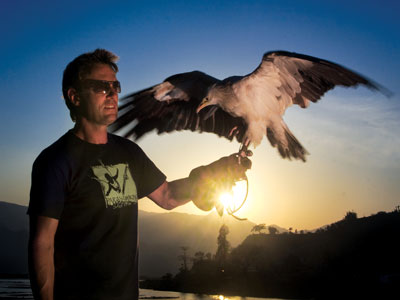 FOO CHEE CHANG |
Parahawking is a fusion, a crossbreed between the age-old discipline of falconry and the extreme sport of paragliding. Paraglider pilots fly alongside trained birds that guide them to 'thermals' (columns of heated air) for rewards, thus enabling the pilots to stay in the air for a much longer duration.
In this union the total is without a doubt more than the sum of the individual parts. Other than the sheer exhilaration of taking to the skies, one also gets to 'share the sky' with birds of prey such as Kevin, an Egyptian vulture and Brad, a black kite, while observing their grace and magnificence in their natural environment. The experience can be likened to being on an aerial safari � a unique environment in which man and bird interact.
It was during his first tandem paragliding flight that Mason, spotting a bird of prey he recognised, had an epiphany. On the day before he planned to leave Nepal to continue on his travels, Mason rescued two black kites and reared them. One of the kites, Sapana, still wows visitors during falconry displays to this day.
Aside than the literal, Mason emphasises that 'share the sky' is a symbolic call to acknowledge the plight of birds of prey all over the world and the importance of bird conservation in a world that has not been kind to them. Nepal, for instance, is rich in bird diversity and home to over 800 species, including the endangered Saker Falcon and Egyptian vulture. The problems are the same the world over � destruction of habitat due to urbanisation and climate change and poaching. Vultures are further susceptible
to poisoning by a drug called diclofenac that is used to treat livestock, which these birds ingest when they feed on carcasses.
"Vultures are not easily accessible to people," explains Hum Gurung, CEO of Bird Conservation Nepal (BCN), the country's premier authority on avian conservation. "Even though they are regarded as nature's rubbish cleaners and don't have the same public appeal as tigers or pandas, it doesn't mean that they don't need protecting."
BCN has helped various state and externally sponsored projects find their feet, for instance in the setting up of 'Jatayu' restaurants in Nawalparasi and Lumbini (which provide safe food for vultures near their nesting sites), and the construction of a Vulture Conservation Breeding Centre in Chitwan.
There is potential for much greater awareness through activities such as parahawking. Given the prominence it has received in the international press and its one-of-a-kind nature, parahawking may well take vulture conservation, and bird conservation in general, to stratospheric heights.
"Once you have flown with these birds and interacted with them, it's hard not to realise that each bird has its own individual character and feel affection for them," says Brad Sander, an accomplished paraglider pilot who works with Mason. He believes that it is only when people experience birds of prey up close that they begin to appreciate their beauty and their place in nature.
But much like falconry, the sport of parahawking too has attracted controversy. A recent Rep�blica campaign accused Mason of infringing the 1973 National Parks and Wildlife Conservation Act, which states that "no private company can hold any animals or birds". In the wake of the report, wildlife advocates demanded that Mason's birds be released into the wild in the Annapurna Conservation Area and similar sanctuaries.
Mason maintains, however, that parahawking has neither a legal nor illegal status under Nepali law. He also points out that since the birds were rescued when they were young (following abandonment) and have been under his care since, they are now fully domesticated and will not be able to survive in the wild. He is currently in talks with the Nepali authorities to resolve the situation. Mason is also seeking recognition of his rescue efforts, and has proposed guidelines with regards to the care and treatment of birds of prey.


